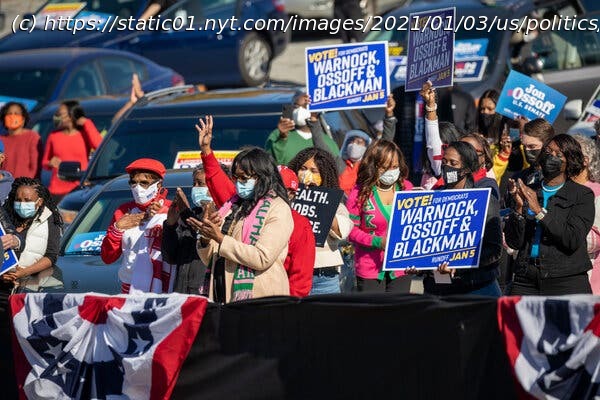A reliably red state for almost two decades, Georgia no longer resembles its Deep South neighbors. President Trump and Joe Biden head there Monday to help rally the bases.
With President Trump touching down in North Georgia on Monday to court white rural voters and President-elect Joseph R. Biden Jr. rallying support from a diverse electorate in Atlanta, the high-stakes Senate runoffs are concluding with a test of how much the politics have shifted in a state that no longer resembles its Deep South neighbors. Should the two challengers win Tuesday and hand Democrats control of the Senate, it will be with the same multiracial and heavily metropolitan support that propelled Mr. Biden to victory in Georgia and nationally. And if the Republican incumbents prevail, it will be because they pile up margins in conservative regions, just as Mr. Trump did. That’s a marked change from the 2000 election, when George W. Bush won decisively in the Atlanta suburbs to capture the state and Democrats still ran competitively with right-of-center voters in much of rural North and South Georgia. After resisting the tide of Republicanism longer than in other parts of the South — it didn’t elect its first G.O.P. governor until 2002 — Georgia became a reliably red state in the nearly two decades since. But now, it’s fast becoming a political microcosm of the country. Although Georgia still skews slightly to the right of America’s political center, it has become politically competitive for the same demographic reasons the country is closely divided: Democrats have become dominant in big cities and suburban areas but they suffer steep losses in the lightly-populated regions that once elected governors, senators and, in Georgia, a native-born president, Jimmy Carter. “Georgia is now a reflection of the country,” said Keith Mason, a former chief of staff to Zell Miller, the late Democratic governor and U.S. senator from a small town in North Georgia. Mr. Miller helped hold off Republican realignment in the state in the 1990s only to accelerate it in the early 2000s when he crossed party lines to endorse Mr. Bush’s re-election. Conservative Democrats like Mr. Miller are rare, as are the sort of liberal-to-moderate Republicans who were also once found in Georgia. Today, though, the standard-bearers of the two parties in the state reflect thoroughly nationalized parties. After nominating a string of candidates for statewide office who they hoped would be palatable to rural whites, only to keep losing, Democrats elevated three candidates in the past two years whose views placed them in the mainstream of the national party and whose profiles represented the party’s broader coalition. Stacey Abrams, a Black former state representative whose district includes portions of Atlanta, fell 55,000 votes short of being elected governor in 2018; Jon Ossoff is a white,33-year-old documentary filmmaker from a prosperous Atlanta family; and the Rev. Raphael Warnock grew up in impoverished circumstances in Savannah before becoming pastor at the country’s most storied Black church, Ebenezer Baptist in Atlanta. “It looks nothing like the party of the ’90s and early 2000s,” said Jennifer Jordan, a Democratic state senator. She recalled how the former governor Roy Barnes, a Democrat who succeeded Mr. Miller in 1999, “used to brag about his N.R.A. affiliation. The Senate hopefuls are embracing the change. “Think about how far we’ve come, Macon, that your standard bearers in these races are the young Jewish journalist, son of an immigrant, and a Black pastor who holds Dr.






